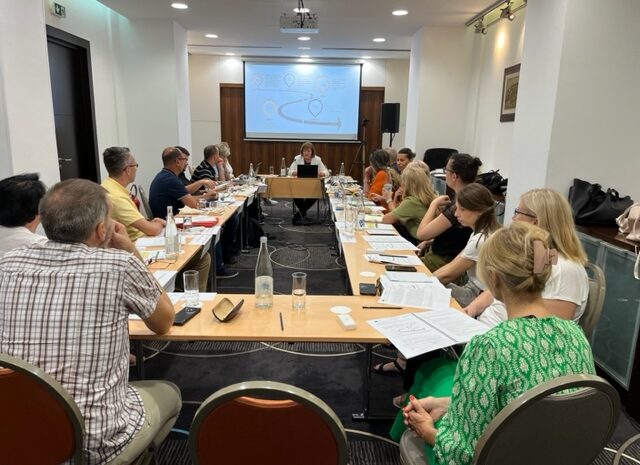
REGIONAL WORKSHOP ON PLANT HEALTH LEGISLATION, 12 – 14 July 2023, Belgrade, Serbia
A two-day regional workshop took place in Belgrade from 12th to 14th July 2023, in response to a request from the Beneficiaries and the project’s Steering Committee’s conclusion on 25th May 2023. The primary objective of this workshop was to support the enhancement of plant health services in the Western Balkans, aligning with main result 3 of the PHWB project – readiness for EU accession.
The workshop aimed to support the WB6 (Western Balkan Six countries) in legal approximation and preparedness for EU accession, particularly focusing on activity A3-1 of the project, which involves reviewing existing legislation and recommending adjustments to conform with EU legislation. The specific focus was on the official controls and other official activities of the new EU Plant Health Regime, which is currently being transposed into the individual legislation packages of the WB6 countries.
To facilitate the discussion and utilization of materials, a workshop manual was prepared in advance. Additionally, an online questionnaire was launched to gather feedback from plant health officers in the WB6 countries, who are responsible for drafting legislation in their respective ministries and other competent authorities for plant health. Prior to the workshop, participants engaged in two preparatory online meetings to encourage active contributions based on their experiences.
Key conclusions drawn from the workshop of the core group of decision-makers (COPHs) and the Focus group on legislation and official controls are as follows:
- Understanding EU New Plant Health Regime: The initial step in transposing EU acquis is gaining a comprehensive knowledge of the structure of the EU New Plant Health Regime, which is based on the Plant Health Law – Regulation (EU) 2016/3031 (PHR) and the Official Control Regulation (EU) 2017/625 (OCR). It is essential to study the interconnected legal basis, and the Project’s experts will facilitate this process throughout the year.
- Consideration of National Legislation: Transposing EU regulations also requires awareness of the horizontal national legislation, such as general administrative or general inspection laws. This knowledge is vital to ensure compliance with the laws and the Constitution.
- Drafting New Laws: When drafting a new law, it is an opportunity for the central authority of plant health to revise and potentially improve the existing system. A regulatory impact assessment (RIA) should be conducted for the draft legislation to define the goals it aims to achieve. The new law should not be a mere translation of PHR or OCR, as certain text elements qualify as provisions of regulations rather than laws. The law should primarily consist of core provisions and provide a legal basis for implementing acts.
- National Importance of Provisions: Many provisions in the law hold national significance, including those concerning NPPO (National Plant Protection Organization) and the wider food safety structure, chain of commands, responsibilities, obligations of operators, expenses and compensations, public services in the field of plant health, public authorizations, competencies of state bodies, and the roles of plant health officers.
- Different Approaches in Transposition: The WB6 countries are planning various approaches in transposing the OCR. Some are considering incorporating OCR into each sectorial law, while others plan to include it in a general law encompassing all sectors. One country is yet to decide on its approach.
- Linking Procedures with PHR Provisions: Regardless of the approach, procedures from OCR, essential for official controls and other official activities, must be linked with PHR provisions to ensure proper implementation. Therefore, drafting all sectorial laws covered by OCR should be carried out simultaneously with consultations of working groups.
- Continued Sharing of Best Practices: The sharing of best practices on the transposition of EU acquis will continue in the region. By October 2023, when the second workshop on legislation is planned, there will be five drafts of Plant Health Laws ready for discussion.
These conclusions are significant milestones in enhancing plant health services in the Western Balkans and preparing for the accession to the EU.